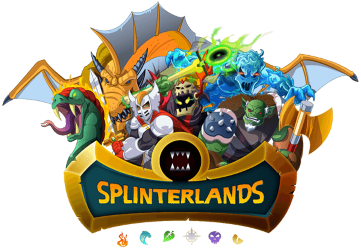Hello everyone! We are back again today with another edition of Splinterland Economics - a series in which we introduce a basic (-ish) economic concept and then apply it to Splinterlands. If this is your first time reading, just to tell you a little bit about myself: my day job is in an unrelated area but I consider myself a little bit of economics nerd - I read a little (or maybe way, way) more news than I should, double majored in econ, and am obsessed with optimization. I love the way Splinterlands is equal parts card game and resource allocation game. My goal with these articles is to share a little bit of what I know with you all.
Our subject today seems particularly relevant to me in the wake of the FTX news this past week, and is a concept which has a name that can take multiple possible meanings. While it can refer to a pandemic (and even had a movie named after it!), it can also refer to the way events may travel throughout the financial and economic world. Today, we'll be talking about Contagion!

What is Contagion?
In economics or finance, "contagion" refers to that way that events that occur in a particular country, institution, or market can spread and have an impact on additional areas, including those which may not be directly related to the initial event. This is related to to the other uses of the term "contagion", because economic events may spread beyond an original scope, just as you may see a contagious disease quickly get carried across the globe.
Financial contagion can occur whenever there is a large shock to the system. In the 2007-2008 financial crisis, declining housing prices caused many homeowners in the United States to default on their mortgages. While you may think that this is a problem which would merely impact the homeowners and the banks that lent them money, thanks to various relationships between different financial entities the impacts spread throughout the economy as various entities . When all was said and done, two major financial institutions in Bear Stearns and Lehman Brothers had gone out of business and the United States went through a serious recession. This is notable because an event that initially only involved banks and a relatively small number of consumers in one country ultimately affected the general economy and even other nations.
Contagion has many different sources, but most of them boil down to the fact that when you have a free flow of capital, then people will tend to try and do whatever it takes in order to keep it safe and/or receive the greatest returns on it. This is not necessarily a bad thing, as it often results in faster economic growth. However, it does mean that many financial regulations arise in order to try and contain possible damage or contagion to limited areas, such as the specific sectors or companies making risky investments. For example, after the subprime mortgage crisis, banks were required to hold greater amounts of capital and there was additional scrutiny of financial instruments such as derivatives and other forms of leverage.
How do we apply it to Splinterlands?
Splinterlands exists on the Hive blockchain, and like it or not the game is heavily influenced by the general crypto environment. This means that there is the possibility of contagion whenever crypto undergoes major events. For example, when bitcoin has major price fluctuations, there is an impact in Splinterlands asset prices such as cards or SPS, even though it operates on an independent blockchain. Many players or investors have significant investments spread over multiple areas, and large changes such as a general crypto bear market or a major exchange going out of business (ahem!) can cause chain reactions as players and other entities reallocate their capital in order to be able to cover liabilities or take advantage of perceived opportunities.
In the world of blockchain and web3, people tend to be free to do whatever they want - regulation generally requires centralization, and is therefore frowned upon by many of the large players in the space. This means that large sums of capital can move quickly and with little notice. Couple this with a host of unregulated projects and many traders using leverage to make a quick buck, and contagion becomes a very real possibility. In Splinterlands if you ever notice some across the board price changes then it is possible that there has been some major news about the game, but it is just as possible that something happened affecting another crypto entity and the price changes had very little to do with the underlying value of your assets.
Why should we care?
Understanding the concept of contagion gives us insight into why markets can make sudden changes which may not have a cause which is immediately obvious. Many different markets are connected in various ways, and being aware of those connections can give us a framework for understanding how current events may have impacts which spread to areas which are (at least on the surface) unrelated. For example, contagion helps to explain why there are banking regulations on financial institutions, and having a deeper understanding of the concept can also help us to see why the failure of a company such as FTX can have repercussions throughout the entire crypto sector, and even spread into the real world.
And while contagion has significant academic and policy implications, it also is important to individual investors - because as long as you are aware of a risk, you can take steps to hedge against it. In your personal investments you may choose to reduce your reliance on a single point which could fail due to contagion - for example, an uninsured bank or exchange, or a currency which is prone to extreme price fluctuations. As always, there is a cost associated with reducing your risk, and deciding whether it is worth the price is one of the toughest decisions to make in investing. Maybe you will choose to hedge, or maybe you will ultimately decide to live with the possibility of contagion, but just don't make your decision without being aware of the big picture!
Thank you so much for reading all the way to the end. Interested in seeing some more of my writing in the future? Be sure to give me a follow! In the meantime, if you'd like to see some of my recent posts:
Deadeye Dhampir - Using Dhampir Stalker in Battle! - Last week's battle challenge, featuring Dhampir Stalker!
Splinterlands Economics: Nash Equilibrium - A introduction to the concept of a Nash Equilibrium, and the insights it can give us into Splinterlands.
Looking Back, Looking Forward: 1 Year in Splinterlands - A look back at my first year playing Splinterlands.
Thinking about giving Splinterlands a try but haven't signed up yet? Feel free to use my referral link: https://splinterlands.com?ref=bteim, and be sure to reach out to me if you have any questions!
All images used in this article are open source and obtained from Pixabay or Unsplash. Thumbnails borrowed with permission from the Splinterlands team or made in Canva.



By delegating your HP or some token to the @thranax bot, you are helping to support the community and the bot and earning healing rewards daily! and also you will get token with healing